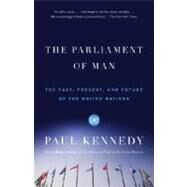The Parliament of Man
, by KENNEDY, PAUL- ISBN: 9780375703416 | 0375703411
- Cover: Trade Paper
- Copyright: 9/4/2007
"With all its defects, with all the failures that we can check up against it, the UN still represents man's best-organized hope to substitute the conference table for the battlefield." Dwight D. Eisenhower, 1961 The signing of the United Nations Charter in 1945 was an unprecedented development in the history of humankind. For the first time, the world's most powerful sovereign nation states came together to create an autonomous organization designed to, in the Charter's words, "save succeeding generations from the scourge of war [and] reaffirm faith in fundamental human rights." Sixty years later, the UN still doggedly pursues that mandate, albeit not without difficulty and certainly not without criticism. InThe Parliament of Man,the distinguished scholar Paul Kennedy gives a thorough and timely history of the United Nations that explains the institution's roots and functions while also casting an objective eye on the UN's effectiveness as a body and on its prospects for success in meeting the challenges that lie ahead. Building on expertise he gained in drafting official reports for the UN's fiftieth anniversary on how to improve the organization's performance, Kennedy makes sense of the many commissions and committees, and how its six main operating bodiesGeneral Assembly, Security Council, Economic and Social Council (UNESCO), Trusteeship Council, Secretariat, and International Courtoperate and interact. Citing examples from the UN's history, he shows how the five permanent members of the Security Councilthe United States, the United Kingdom, Russia, China, and Franceon numerous occasions overcame political antagonisms to spearhead military supervision of aid in humanitarian crises, and how lack of cooperation among the great powers has hamstrung such initiatives as the control of greenhouse gas emissions and exacerbated the deleterious effects of globalization on developing nations' economies. As a body, the UN emerges here for what it is: fallible, human-based, oftentimes dependent on the whims of powerful national governments or the foibles of individual senior UN administrators, but utterly indispensable. InThe Parliament of Man, Kennedy ably proves that "it is difficult to imagine how much more riven and ruinous our world of six billion people would be if there had been no UN social, environmental, and cultural agendasand no institutions to attempt to put them into practice on the ground." From the Hardcover edition.







